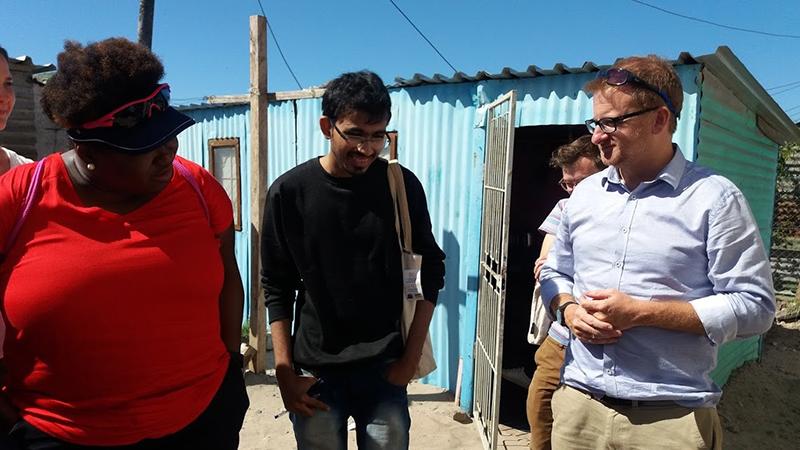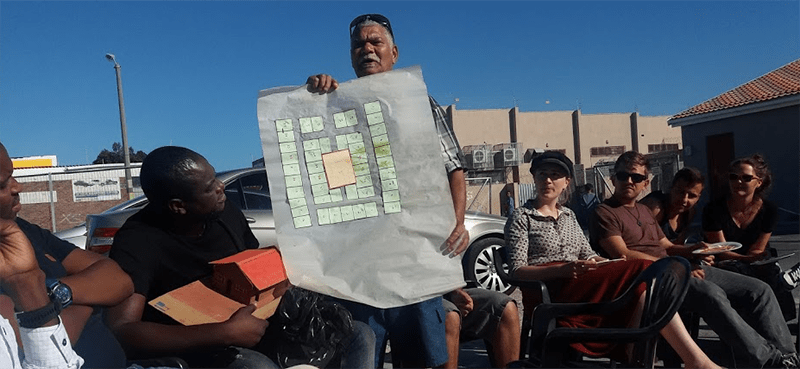In the first six weeks of the first semester African Centre for Cities hosted a joint City Research Studio (CRS), a cornerstone of the newly launched MPhil in Southern Urbanism and the Masters in Critical Urbanisms (University of Basel) semester at UCT. CRS was conceived of as a three-part experimental space for students, and faculty, to engage in the City, to learn to walk, see, smell, touch, embrace, explore and reimagine the city through intimate encounters with space, place and people mediated by diverse research techniques.
In its first iteration, the first part of CRS focused on ‘the Lived Experience of Housing Policy,’ a programme coordinated by Professor Sophie Oldfield and Noah Schermbrucker, of People’s Environmental Planning (PEP), a Cape Town NGO that works to solve stalled housing projects.
PEP facilitated an entry point into three housing delivery contexts in Cape Town. Each of the three sites offered a first-hand opportunity to visit and engage with community leaders, residents, and with the NGOs that have worked with these neighbourhoods to navigate the complexities of housing policies and processes. Our first site visit to Sweet Home Farm, in Philippi, organised with Ubuhle Bakhle Ubuhle (UBU), an NGO working in the area, gave us insight into the building of water and sanitation infrastructure in this informal settlement as well as opportunity to engage with community leaders and visit the city’s ‘temporary housing’ in this area.

The second site, Ruo Emoh, in Mitchells Plain, offered insight into the housing struggles of families who moved into this long-fought for housing project in December 2017 as well as into the work of PEP and the South African SDI Alliance who supported Ruo Emoh. In partnership with these NGOS, we conducted housing and family histories with the new residents, whose recent move to permanent housing marks the culmination of a nearly twenty-years of advocating and fighting for housing security.

In our third site, Vukuzenzele in Gugulethu, we participated in a workshop organised by PEP where, thirty residents who have been living here for twenty years at long last received the title deeds to their homes.

These sites gave students opportunities to reflect on two themes. First, what does it mean for ordinary city dwellers to secure housing; and, its corollary, what has it meant to families to be in precarious housing? What are the challenges and strategies of ordinary people to secure and build a place in the city? Second, what are lived experiences of policy? And, how does this perspective on policy help us understand struggles to access and secure housing; what they require and demand of ordinary citizens and NGOs? Through this engagement, students have reflected on housing research, and what roles, purpose and possibilities research can offer in this field. Conversations and collaborations with residents and NGO partners have provided rich opportunities for students to experiment with interviewing skills, to engage with the long-term, multi-generational lived realities of housing shortages and struggles for shelter, and to reflect on the everyday experience and process of engaging with government to access housing. For students, this process was a learning experience as well as an eye-opener to the real life on the ground experiences of the journey to building and owning a home. It emphasised how vital it is to record and reflect on the stories of residents to gain invaluable information about the inner workings of the housing struggle. In varied ways the CRS has helped engage with the complexities of community participation and waiting for housing, offering insights into what transformation in housing access might look like in South Africa.